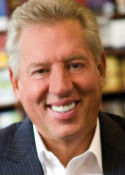 What drives you to get up in the morning?
What drives you to get up in the morning?
Most people settle into one of three areas: survival, success, or significance. If you’re like many people, you may be struggling just to keep your head above water. You’re in survival mode. Whether because of circumstances, setbacks, or poor choices, you have to put a tremendous amount of effort into just making it day to day.
If you’re working hard to make life better for yourself and your family, then I applaud you. Keep working.
But once you’ve gotten to a place of stability, then what? What will you live for? Will you serve yourself or others? Will you put all of your energy into success, in trying to get farther ahead than others? Or will you work toward significance? Will you try to make a difference by helping others get ahead?
At this point, most people fresh out of survival mode believe they should focus on success before tapping into significance.
But here’s the thing…
Much of my career as a speaker and writer has focused on helping people who’ve already achieved a level of success to find true meaning in their lives. For some that’s a fairly smooth transition. For others it’s not. Many people I interact with have gotten to a place where they’ve reached some of their financial goals—or surpassed them—and they thought it would bring some kind of fulfillment.
They discover that they’re still not satisfied. And in some cases, they are actually less fulfilled than when they started their journey. They went into their journey thinking, “If I get more for me, I’ll be happier.” They thought it would bring them satisfaction and fulfillment, yet their lives feel hollow.
Many people tie their significance to social position, their title, their net worth or bank balance, the car they drive, their prestigious address, the man or woman on their arm, or some other status symbol. Their mentality is, “If I do enough and have enough, even if I am self-centered, it will bring fulfillment.” The problem is that self-centeredness and fulfillment cannot peacefully co-exist. They’re incompatible.
Sometimes people struggling with this issue are uncertain about what to do. Often, they grapple with the idea of making a career change in their forties or fifties. When I encounter someone in this situation, I ask:
“Do you really want to switch careers, or do you want to switch to a life that matters?”
Read More…
 What drives you to get up in the morning?
What drives you to get up in the morning?
Most people settle into one of three areas: survival, success, or significance. If you’re like many people, you may be struggling just to keep your head above water. You’re in survival mode. Whether because of circumstances, setbacks, or poor choices, you have to put a tremendous amount of effort into just making it day to day.
If you’re working hard to make life better for yourself and your family, then I applaud you. Keep working.
But once you’ve gotten to a place of stability, then what? What will you live for? Will you serve yourself or others? Will you put all of your energy into success, in trying to get farther ahead than others? Or will you work toward significance? Will you try to make a difference by helping others get ahead?
At this point, most people fresh out of survival mode believe they should focus on success before tapping into significance.
But here’s the thing…
Much of my career as a speaker and writer has focused on helping people who’ve already achieved a level of success to find true meaning in their lives. For some that’s a fairly smooth transition. For others it’s not. Many people I interact with have gotten to a place where they’ve reached some of their financial goals—or surpassed them—and they thought it would bring some kind of fulfillment.
They discover that they’re still not satisfied. And in some cases, they are actually less fulfilled than when they started their journey. They went into their journey thinking, “If I get more for me, I’ll be happier.” They thought it would bring them satisfaction and fulfillment, yet their lives feel hollow.
Many people tie their significance to social position, their title, their net worth or bank balance, the car they drive, their prestigious address, the man or woman on their arm, or some other status symbol. Their mentality is, “If I do enough and have enough, even if I am self-centered, it will bring fulfillment.” The problem is that self-centeredness and fulfillment cannot peacefully co-exist. They’re incompatible.
Sometimes people struggling with this issue are uncertain about what to do. Often, they grapple with the idea of making a career change in their forties or fifties. When I encounter someone in this situation, I ask:
“Do you really want to switch careers, or do you want to switch to a life that matters?”
The problem usually isn’t the job or career. When people are self-centered, they can make external changes, and they won’t be any happier in their next career. No matter where they go, there they are.
Instead, they need to shift to significance by putting other people first. Their thinking needs to change from What’s in it for me? to What can I do for others? Until that change occurs, happiness, fulfillment, and significance will always be out of their reach.
That doesn’t mean success is bad. The reality is that many people must achieve a certain amount of success before they’re ready for significance. They need to have found themselves, achieved something, and made themselves valuable before they have something to give to others.
I saw this in my brother, Larry. By the time he was 40 years old he had already made enough money that he would never have to work another day in his life.
He once told me that his temptation was to quit working, but he knew that wouldn’t make him happy. “So now I work for another reason,” he told me. “I don’t work for another home. I don’t work for more money. All of the work I do now is going to allow me to give money away. I now work for a great cause—I work to help other people.”
There’s an important lesson here. Larry understood that he didn’t need to leave his sweet spot in order to help others. He shouldn’t give up the thing he was best at, which was making money, so that he could do something else that didn’t suit him, like becoming a missionary. He continued to use his talents, but for a better purpose. His money would work for him and become a river of influence to positively impact other people. That is true intentional living and true significance. He is living a life that matters.
John Maxwell grew up in the 1950s in the small Midwestern city of Circleville, Ohio. John's earliest childhood memory is of knowing that he would someday be a pastor. He professed faith in Christ at the age of three, and reaffirmed that commitment when he was 13. At age 17, John began preparing for the ministry. He attended Circleville Bible College, earning his bachelor's degree in 1969. In June of that same year, he married his sweetheart, Margaret, and moved to tiny Hillham, Indiana, where he began his first pastorate.
While serving in his second church, Maxwell began to study the correlation between leadership effectiveness and ministry effectiveness. On July 4, 1976, while preaching at a service commemorating America's bicentennial, John sensed that God was calling him into a ministry to pastors. Within days after that event, pastors began to contact him, asking for his assistance in nurturing their churches. Over the next four years, on an informal basis, John helped scores of fellow pastors. Then, in 1980, he was asked to become Executive Director of Evangelism for the Wesleyan denomination.
Though his time at Wesleyan headquarters was productive, John soon realized that his deeper desire was to help pastors from numerous denominations. He knew that desire would be unfulfilled if he were to stay at denominational headquarters. As a result, in 1981 John accepted the call to return to the pastorate, this time at Skyline Wesleyan Church in the San Diego, California area. But he did so with the church's blessing to pursue his vision. The Skyline congregation allowed him to continue mentoring and assisting pastors even as he led them to new levels.
In 1985, as he continued to equip and encourage other pastors, John took the next crucial step in leadership development. He founded a new company called INJOY and created the INJOY Life Club, featuring a monthly tape for leaders. The fledging operation, established in the corner of a garage, was soon bursting at the seams. The INJOY Life Club tapes were received with great enthusiasm, and the number of subscriptions quickly increased from hundreds to thousands. Simultaneously, the demand for other resources and seminars exploded. Pastors from coast to coast were responding, and their desire for help was even greater than John had anticipated.
As the years passed, INJOY began demanding more and more of John's time. In 1995, he resigned from his position as senior pastor at Skyline following a very fruitful 14-year tenure. The church had tripled in size and its lay ministry involvement had increased ten-fold. Dr. Maxwell is in great demand today as a speaker. Through his bestselling books, audio and video resources, and major conferences, he communicates directly with more than one million people every year. He is frequently asked to speak for organizations such as Promise Keepers and Focus on the Family, but his greatest joy and desire is to help pastors become better leaders.
Because the need for leadership development knows no borders, John established EQUIP, a non-profit organization which trains leaders in urban communities, academic institutions, and within international organizations. EQUIP is also spearheading a movement which has enlisted more than one million pastoral prayer partners who covenant to pray specifically for those who shepherd God's flock.
John continues to seek new opportunities to help churches and church leaders. He knows that one thing is constant: the only hope for the world is salvation through the Lord Jesus Christ, who gives life abundantly.

